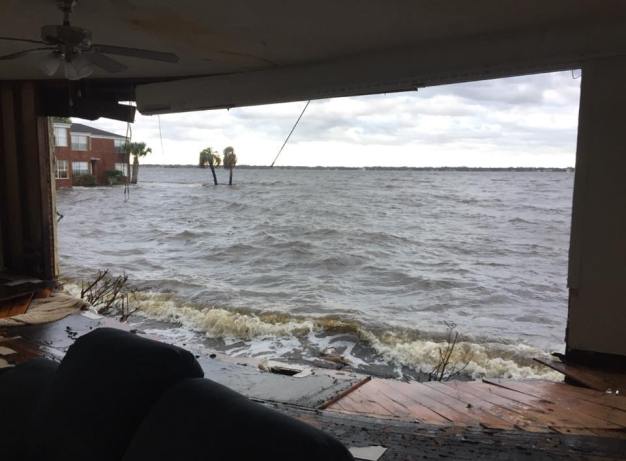On the evening of September 11, 2017, just after a hurricane had hit, I walked into my apartment and saw this:

That, my friends, is a giant hole where a wall should be and a river where a river should not be. Crazy, right? Trust me when I tell you that seeing it in a photo pales in comparison to what it felt like to actually be there. The vast majority of everything I owned was destroyed.
I’ve actually tried to stay away from broadly publicizing it for various reasons, but I’m mentioning it here because something became abundantly clear to me after the storm:
People either dramatically misunderstand how God’s “blessings” or “favor” work or they are not thoughtful in their proclamation of God’s “blessings” or “favor” in their lives. Sometimes, it’s both.
After a storm, people say something like, “We’re so blessed because nothing bad happened to us! That’s such a God thing.”
After a deadly shooting at a concert, they may say, “I was supposed to be at the concert, but I’m so blessed that I wasn’t!”
People get a job they’ve been praying for and say, “I’m so glad I’ve got God on my side!” or reference having “God’s favor.”
Maybe someone has been praying for some worldly, physical item for a long time and they receive it. Or maybe someone has cancer that goes into remission. Then, you may hear something like, “Thanks to our dedication to asking and our obedience in waiting, God gave it to us! He provides if you just believe hard enough!” Maybe they’ll end it with a “#blessed “or a “#WontHeDoIt” for good measure.
But problems arise when you claim God’s blessing or favor because something bad didn’t happen or because something good did.
What about people who did have issues during the storm? What about those who did attend the concert and ended up injured or dead? What about the people who didn’t get the job? What about people who prayed and prayed and prayed some more to get that thing they thought they needed or that they or a loved one might be healed and they didn’t get that thing or they weren’t healed? Did God just choose to “bless” you over them? Does he favor you over them? Did they just not pray hard enough?
This way of thinking can be damaging to others’ spiritual lives and our own. After all, what happens when something seemingly bad does happen to you? What happens when you don’t get something you need? Has God now abandoned you? Are you now less blessed than the others?
I believe we are choosing simplicity over nuance and trading clarity for comfort.
In order to fix this, we need to be more thoughtful with what we say and do. We must also give serious thought to what God’s “blessings” really look like. Even a casual glance at scripture turns up a list of characteristics of “blessed” folks and “those who aren’t affected by disasters” or “those who get everything they pray for” aren’t on there.
The “poor in spirit” are blessed.
“Those who mourn” are blessed.
“The meek” are blessed.
“Those who hunger and thirst for righteousness” are blessed.
The “merciful” are blessed.
The “pure in heart” are blessed.
The “peacemakers” are blessed.
“Those who are persecuted because of righteousness” are blessed.
Don’t God’s “blessings” in our lives seem to be more about the eternal than the temporal? More about who we are or how we react to life than what we have or what life does or doesn’t throw at us?
“Blessed are you when people insult you, persecute you and falsely say all kinds of evil against you because of me,” Jesus tells us.
Doesn’t this suggest that “blessings” are likely to come from what we would consider to be bad things?
I have no doubt that we are blessed by God. But this way of thinking about God’s blessings is damaging to us and others. It’s also self-centered and limiting. It influences how we think about God. The reality is God and God’s blessings are so much bigger and better than what we think and the reasons behind blessings are far less selfish.
So, then, how do we fix it? And how can we talk about God’s “blessings” in our lives without in turn claiming his favor over others?
We acknowledge there’s a problem.
Take a deep, hard look at your life. If you’ve spent the entirety of it thinking about God’s blessings only in terms of successes or positive things that happen to you, you’ve likely missed out on a much deeper richness and it’s waiting to be discovered. Pay particular attention to the rough spots in your life — where did you see God’s goodness in that? How did you grow from that experience?
We think about others, not ourselves.
Just a few days ago, Michael Curry, presiding bishop of The Episcopal Church, had this to say about self-centeredness:
“If you want to know a single word for self-centeredness from our Christian tradition … it’s the word ‘sin.'”
“Sin is about living my life only for me as though I … am the center of the universe and you are on the periphery. And as long as I’m the center of the universe and you are on the periphery, I can treat you like anything. But when love rules, it’s not just about ‘me.’ It’s about ‘we.'”
Once we look at our blessings through the lens of others, or at least consider others in the process, we gain an entirely new perspective. Blessings should not simply enable us in some way — they should enable us to love God and/or love others better and more often.
No matter what comes our way, we search for the goodness — and for God.
While I don’t believe God causes all the crappy things that happen to us, I do believe God can be found in our circumstances. God, after all, is not only for us, he is with us. God will be there with us in the deepest depths of darkness and highest highs of the goodness.
We handle with care.
If we are not being self-centered, this won’t be a problem. We need to understand that our words have meaning. If you’re preparing to share a story of God’s “favor” or “blessing” in your life, think first about how it helps others. And think about unintended consequences of what you may be saying. For example, if you happened to make it through a storm just fine, perhaps the real blessing is that you’re able to help those who were less fortunate.
Shortly after the hurricane, our priest at church asked us to share with someone in the pews next to us a moment when we saw God in the storm. My answer was this: the goodness of people.
People couldn’t wait to help. And I’m not just talking about close friends and family. Co-workers from literally across the country. Members of our church who we hadn’t yet met. People I hadn’t spoken to in years. Strangers.
And this is true, by the way, on a higher level. So many people stepped in to help others, regardless of who those “others” were. Isn’t it funny how so many superficial barriers crumble when people are in need? How we can suddenly focus on the right stuff like loving our neighbors?
God’s not always going to give you want you want or what you prayed for. And when you happen to get what you want or what you prayed for, it’s not a sign that God favors you over others. And the “thing” itself is often times not actually the blessing.
We do a disservice to ourselves, to others and to God when we put God in a box. It may be comfortable, but it’s a human construct destined to fail. Rather, we should embrace what comes our way and do the hard work of uncovering what blessings await, regardless of the circumstances. That, my friends, is a much firmer foundation on which to stand.
